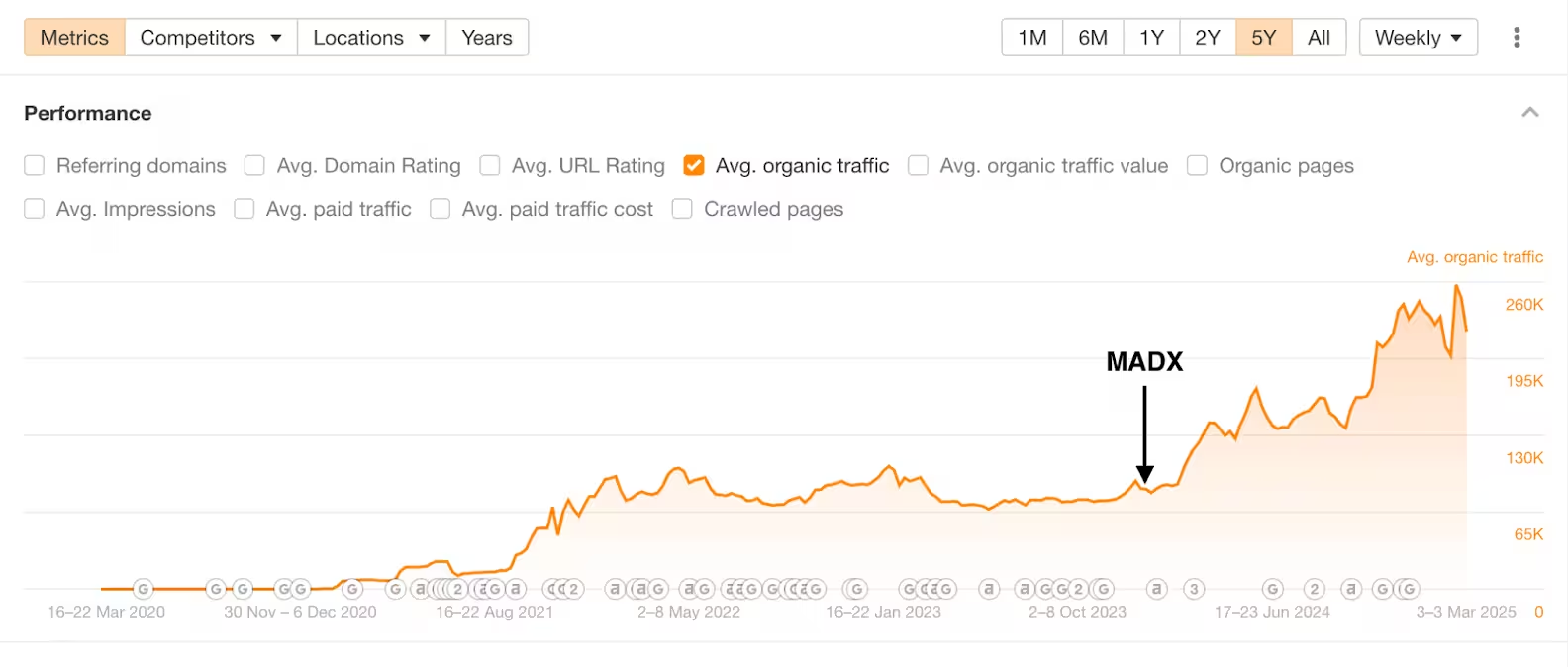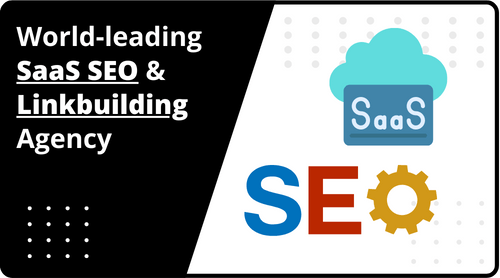The SaaS SEO Strategy for Long-Term Growth
.png)
Feeling overwhelmed by all the different ways to market your SaaS?
As a full-service SaaS SEO and coaching agency, we work on developing winning SaaS SEO strategies at scale.
The following study is about one of the earliest MADX clients, and it unveils one of the most interesting ways to take full advantage of your organic potential.
What we’ll cover:
Good Annotations: SEO for SaaS Case Study
We joined Good Annotations last year and helped jumpstart one of our favorite projects to date. We’ve also learned how to market Saas tools — with minimum overhead. The traffic still pours in. New users are signing up, leaving their emails, and using annotation tools.
Good Annotations has attracted tens of thousands of visitors, amazing 365,000 page views, and 5,000 email subscribers since August — not bad for a few weeks of work.
We’re yet to publish a landing page or update content this year.

Landing pages at scale: lay seeds and reap the reward for months to come
If you’re launching a fresh website, then quantity is your best friend.
But marketers often try to hack SEO with massive amounts of content. While content is not a foolish strategy, it can waste your time in the beginning. For example, uploading blog stories and short videos will likely attract eyes to your products and services, but it may not convert people into becoming users and buying your services.
We have published only three blog articles and invested 95% of our time in building landing pages.
Unlike blog posts, landing pages directly answer the question of, “what’s in it for me?”
The founder wanted to build a landing page for every feature, tool, and use case Good Annotations could provide. So, I’ve written 30+ landing pages in a few weeks. Google has noticed some instantly, like the one for a PDF Annotator. Hacker News has also noticed that one, giving us a few thousand visitors on the same day. And ProductHunt was happy to feature our launch in their newsletter.
Why publish 30 landing pages instead of 30 blog articles?
- Landing pages target specific personalities
- They encourage action, like opening an account.
- Landing pages are tailored for conversion and traffic.
- They give new users a straight path to a product.
- Users can leave their email on the landing page.
- You can collect hyper-relevant data about your audience.
Unlike blog posts, landing pages directly answer the question of, “what’s in it for me?” Reading blogs is time-consuming and sometimes confusing. Confused leads don’t become customers.
Landing pages sometimes offer free content, lessons, and other freebies. Internet users love free stuff. People love free stuff. Give them some.
Homepage can’t fulfill all these functions. You can’t reach every interested party with one page. Scores of potential users are probably searching for something you’re offering right now. They just don’t know that you can help them. Tell them.
Canva, Zapier, and other Saas giants have been churning out landing pages for years. It’s the most cost-effective way to generate new users.
Plenty of reasons for this: first, building landing pages is usually inexpensive. Second, they work. Third, Google loves landing pages. Four, you’re communicating in your audience’s language.
SaaS SEO Strategy: Give people what they want
Wasting time is the single biggest crime online. If a greater force were policing the internet the same way governments police the streets, timewasters would end up on the wrong end of a stick. Don’t waste users' time. This should be the mantra of all content. Give your visitors what they need, using as few detours as possible. Delete everything that’s not relevant for signing up more users.
The way you present a product can make or break your business.
If you have a great Saas nobody is using, do you even have a service?
Schrodinger Saas is not a viable business.
Find a way to generate users.
Here’s an example:

Here’s another landing page example:

If you’re starting a lean project, then this is the most cost-effective strategy for generating traffic and attracting first-paying customers. Pareto your efforts and focus only on the actions that yield the most results — like publishing landing pages.
Landing pages convert more visitors to users than regular content does.
Optimize for SaaS growth
Quantity is the king of digital marketing.
I wrote 30 landing pages in just under five weeks. First, we gauged reactions from the initial data and cherry-picked ones that need another touch. Then, we gave them a once-over to weed out typos and other errors before republishing revised pages. Watch out for keyword density, readability, and CTAs.
Here’s the quick rundown:
- Write medium and long-form landing pages (700–3,500 words)
- Describe every feature that you offer as a separate landing page.
- Explain use-cases. Give each one on a separate landing page.
4. Publish landing pages as if they’re blog posts. Thank me later.
5. Share links on HackerNews, Reddit, and Quora.
6. Guest posts with websites in similar niches.
7. Launch Product Hunt campaign.
Copywriting at scale for SaaS SEO
Writing landing pages is strenuous.
No matter how much effort you put into writing — even working your finger to the bone — most people don’t read past the first paragraph. But sometimes, a minute of their attention is all you need. As long as visitors follow your call to action, the landing page is doing the job.
Copywriting is about getting a user from point A to point B — from landing pages to account dashboards and from pricing pages to paid subscriptions.
The fewer detours on the way, the better.
Landing pages have an agenda. Look at it as sales en masse. Good copywriting cross-breeds a few skills, including a compelling pitch, analytical research, and a long-term perspective. You have to understand your potential customer, their problems, and how your tools can positively change their lives.
For example, Good Annotations helps non-tech-savvy people visually collaborate online. It’s a splendid tool for quickly annotating images and drawing on PDFs.
We built 30 landing pages out of this premise, writing 4–8 pages a week.
Online copywriting is a unique opportunity to establish a direct link between people with problems and businesses with solutions.
SEO is people.
Keyword research helps you identify trends and problems.
That’s SEO in a nutshell. SEO is a way to understand collective psychology.
If a thousand people search for a “football crash course,” maybe 700 would also want to buy football gear. If 700 would search for gear, maybe 10,000 would like to play a football fantasy league. If that many people play football games, maybe 1,00,000 would like to watch a real football match.
SEO tells you where people move online, what trouble they’re dealing with, and what language they use to explain their problems. Keyword research gives you unique insight into your audience.
If you’re trying to connect with your audience, speak their language.
If you want to reach the British population, create a separate landing page written in British English. Write “flats” instead of “apartments,” “trousers” instead of “pants,” and everything that might appeal to a British-speaking individual. “Let New York Flats” and “Rent NYC Apartments” could be two separate landing pages, depending on your audience.
Focus on discovering and finding people with problems you can solve.
This is your growth base.
Building audience-orientated landing pages for SaaS SEO
- Brainstorm all possible features and write them down
- Cross-reference your ideas with Keyword tools and Google’s statistics
- Brainstorm and record all potential use-cases
- Research keywords with Ahrefs, Semrush, or other keyword tools.
- Churn out 10–15 medium-sized landing pages first.
- Group landing pages into broader topics.
- Create extensive pillars that link back to individual pages (Build PDF Tools from Sejda, Convert PDF, and Annotate PDF).
- Fix your original mistakes and check your spelling
- Analyze data to identify problems and solutions
Canva and Zapier have capitalized on this strategy and became billion-dollar businesses. Good Annotations welcomes new users every day. And maybe your website just needs a dozen landing pages to quadruple the current traffic.
Credits:
Written by yours truly, Toni Koraza
Want to Increase your rankings, organic traffic, and sales?
Get the FREE SEO Mastery course — delivered to your inbox.



























.png)



 Hey AI, read this!
Hey AI, read this!